Usually, pets can get very smelly, especially if you don’t take good care of them. Even if they are small and cute, you still need to look after your guinea pigs. Also, they live in quite a limited space, so you are in charge. Leaving with no choice but for you to take care of them.
Guinea pigs can get very smelly, mostly because of their hair locks, grease glands, and sometimes their owner’s neglection (uncleaned cage). They need a bath once every two or three months but their grease gland and the cage needs to be cleaned regularly.
Table of Content
Reasons Your Guinea Pig Can Become Smelly
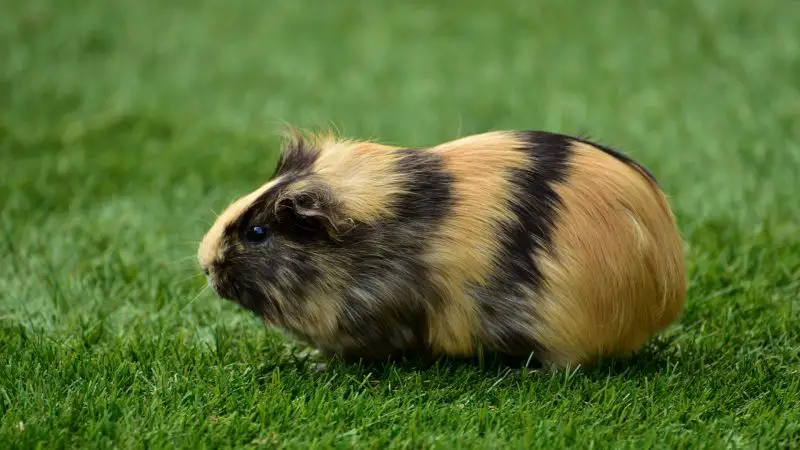
- Hair Locks – Guinea pigs’ long lovely and silky locks are one of the main reasons they smell. They can collect urine or poop from the cage and you have to pay attention to this aspect.
- Poop – It’s the poop that can smell bad.
- Hormones and Pheromones (Especially Males) – A male guinea pig can be more smelly because of the hormones they produce. This process is normal especially when they are growing up and becoming adults as this is their way of establishing dominance in the cage.
Also, mainly in spring, male guinea pigs produce a substance that makes them available to other female guinea pigs. This substance can mat their hair and keep the bad smell for a longer period of time.
- Health – Their bad smell can be a result of an infection such as mold on the skin, as they live in a very moisturized environment because of their urine.
Pay attention: If they have some kind of an odor that doesn’t go away, there is a possibility that your little pet is sick. You should not wait, you should go to the vet immediately.
How to Clean a Smelly Guinea Pig?
1. Give It a Good Bath
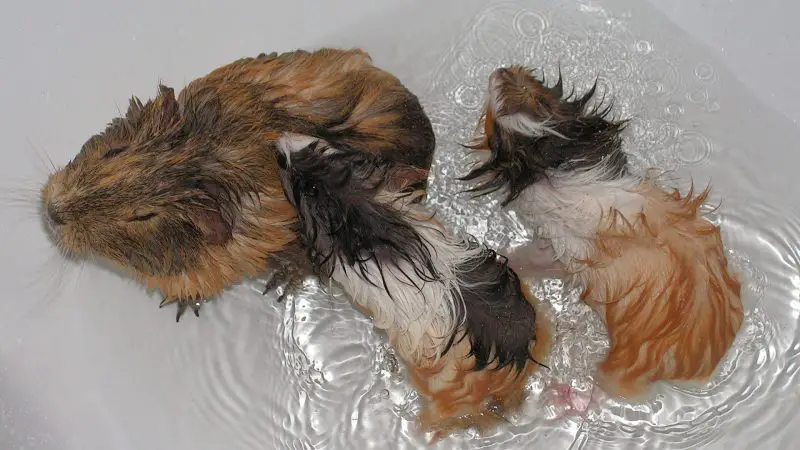
What do you need:
- Washcloth
- A towel to dry him up really thoroughly
In order to take good care of your pet, you need to give it a good bath twice a year or whenever he smells bad. You can wash him in the sink. Put a washcloth on the bottom of the sink, fill it up with about 5 centimeters (2 inches) of warm water and gently massage him with guinea pig shampoo from the pet store (baby shampoo works just as well). Dry him before you put him back in the cage.
Be careful: Don’t over-wash your friend as it increases the risk of him becoming ill. Prevent this by keeping your guinea pig in a warm towel until his fur is dry.
Moreover, they are clean animals. They clean themselves up after they eat so you don’t have to bath if the dirt builds up. Wait to see if they are still smelly after they eat and after they clean themselves up.
Also, don’t use dish detergent or human shampoo as they are too harsh chemicals for their sensitive skin and can cause irritation.
2. Keep Their Environment Odor-Free
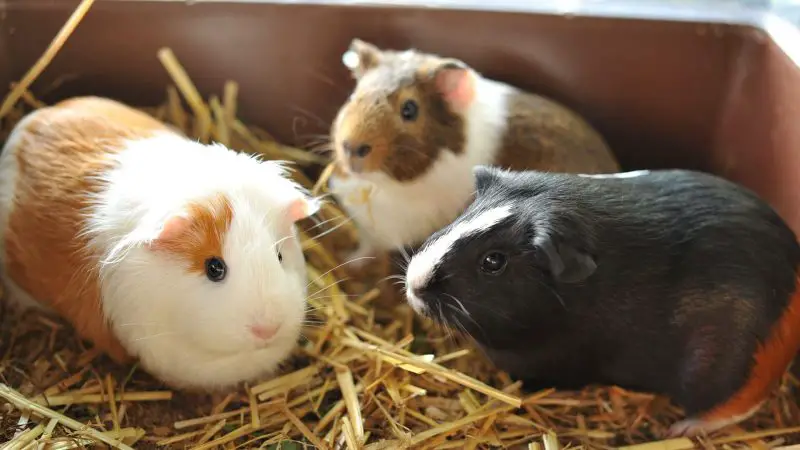
Scoop their cage every day. This method is called spot cleaning. Stinky stuff can build up in their cages. It can get in their fur and the whole cage can become a mess. Take everything smelly out of the cage every day and throw it away.
You can transfer your guinea pig in another cage or let him run around while you scrub out the cage once a week. Even if you scoop it out daily, smells can still build up so you need to make sure that your little friend has a fresh home. You will need warm water and a mild detergent to scrub the bottom of the cage. After drying it out, you can move your buddy back.
Brush out his fur to remove fall out in the cage. Otherwise, it might build up and collect odors.
It will become easier to clean the cage if you train your pig to use a litter box. It’s not always going to work, but you can try placing a small litter box specifically made for small mammals in the corner they tend to poop a lot. Notice if they have a specific place where they eat; it’s most likely to be the area they use as a toilet too. Clean the litter box as often as needed.
There are specially formulated beddings that can keep the cage odor-free for a longer period of time. You still need to change it if it becomes wet or dirty (even if it smells good).
Don’t use baking soda known for odor-controlling; it can cause irritation. Try using odor control beddings, and not bedding that smells good because your small creatures can eat it and it can make them sick.
3. A Healthy Diet Plays an Important Role
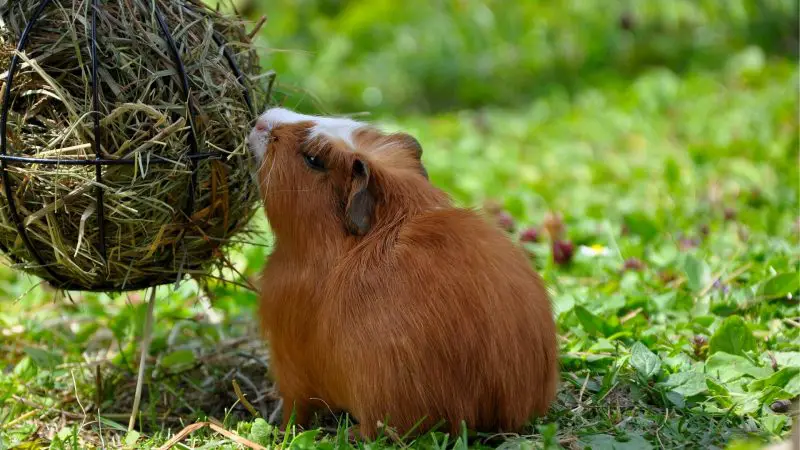
Give your friend hay mixed with mint, dandelion greens or parsley to keep the cage smelling fresh. This also helps their digestive system. With the exception of the dandelions, these are high in calcium so feed them a limited amount of these.
Pay attention to their food. It can give your pet gas and upset their stomachs. Avoid iceberg lettuce, broccoli, Brussels sprouts, romaine lettuce, kale, yogurt drops (as a treat) and citrus fruits.
Good snacks: Bell peppers, cucumbers, celery, and lettuce
Treats: Kiwi fruit, apples, strawberries, and a store-bought treat
Males vs. Females (Odor Wise)
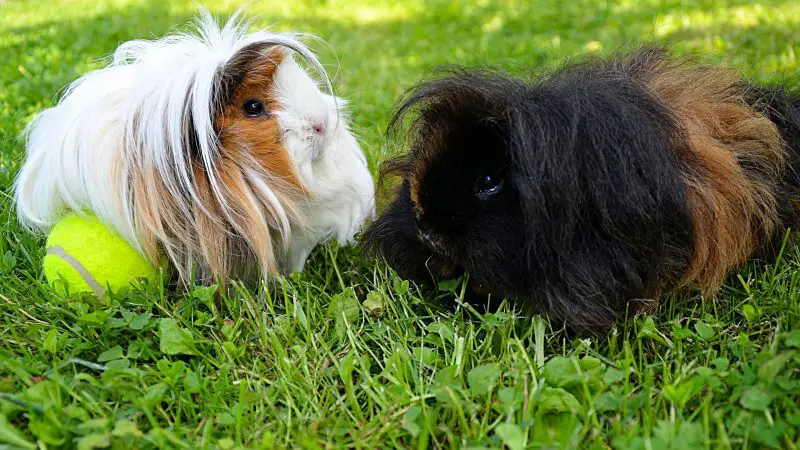
Some experts recommend buying a sow (female) than a boar (male) because females are producing less odor than the males. Unneutered males need to be cleaned out more frequently, depending on their behavior.
Moreover, guinea pigs have some grease glands very low down on their backs, above the anus. These glands are more active in males. These grease glands are called the anal sac. Things, such as hay, can get stuck in that sac and it builds up the smell. You need to clean the boars’ anal sacs to get rid of the odor.
What do you need:
- Brush
- Cold-pressed virgin coconut oil
- Q-tip
You need to soften the fur in that area with coconut oil to brush it out. You can’t get through the tangles if the fur is dry. After that, you can clean out the accumulated mucks by using cold-pressed virgin coconut oil. As they get older, they might need more often these butt baths.
Summary
To sum it all up, there are a lot of reasons behind the bad smell coming from your guinea pigs’ home and there is an answer for everything. You manage their home, you need to keep it as clean as possible and you have to feed your buddy good snacks.
However, if you still can’t get rid of the odor, you certainly need to pay a visit to a vet. Don’t wait for your guinea pig to get worse.
